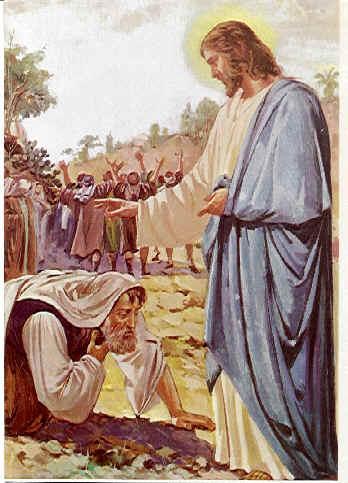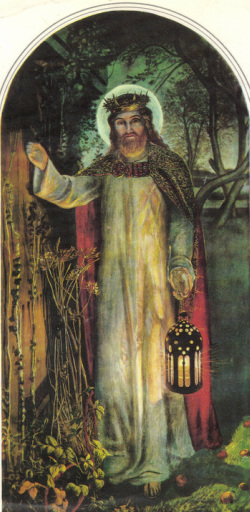
Sin is like leprosy, that deforms the soul and deprives her of the grace and friendship of God. A soul adorned with the favors of God is one of the most beautiful of God's creations, little inferior to the angels. Such a beautiful soul is dear to God, to the Blessed Virgin, to the angels and to all the saints; this soul possesses such excellence that the inhabitants of heaven desire her company for their enjoyment and the glory of God. No tongue can describe the greatness of the love of Jesus for a soul that is in grace. But when the soul is in a state of sin she becomes an object of the greatest abhorrence to almighty God. If we could only see the spiritual life as it really is, and realize what a horrible being the soul is which is covered with the rottenness of sin, we should fear to remain in that state.
God revealed to St. Catherine of Genoa the filthiness of sin, and she was so struck by it that she was at the point of death from the shock. Paul the Simple was accustomed to sit at the gates of a church to invite in the passers-by, good and bad. One day he saw a sinner in an abject condition coming along, accompanied by two devils; behind him followed his guardian angel full of shame and looking more like a vanquished prisoner than an angel of God. We all have pity when we see a convict going along, handcuffed, the guard standing over him with a loaded gun, and treating him with harshness. But we have more pity for such a one when we know that he is well educated, of good family, and that his condition forces him to lead such a life. Sin reduces us to the same condition of slavery, and binds us hands and feet to the devil, who is our attendant, who gives his commands in such a manner as to frighten us into obedience. 0, if Christians would think what a great evil sin is, they would not commit it so easily.
The saints, the great friends of God, had a just appreciation of what sin is; they trembled at the mention of sin; they would allow themselves to be cut into pieces rather than commit one. St. Frances of Rome when passing near a house where she knew sins were committed fainted, and afterwards said, "That is a house of ingratitude to God." St. Stanislaus, on hearing bad words at a dinner, fainted because he was so horrified. St. Anselm says, "If on the one side hell was open before me, and sin came from the opposite
direction, I would rather throw myself into the flames of hell than go to meet sin." My dear young people, should you ever be in sin, go at once and show yourself to the priest, and get rid of that leprosy by tears of compunction.
Why did Our Lord send the ten lepers to the priest uncured, while He could have cured them at once? Evidently Our Lord had a hidden meaning in His action. He sent them to the priest to be inspected and to be declared free from leprosy, according to the law of Moses. It signified to the lepers that the authority of the Church must be maintained, and to us that self-accusation to the priests appointed by authority is necessary. You, also, my young friends, when you find yourselves in sin, show yourselves to the priest at the tribunal of penance, for the priest has authority from Jesus to loose and to bind the sins of the penitent. Do not delay a long time, for if, through negligence, you hesitate to confess, you will little by little lose the horror you have felt at the seriousness of your condition, and you will put aff your confession longer and longer, until you would be content to wait for years, as it often happens; for while you see that you prosper, that you enjoy health, that you continue to have friends and good companions, and that God shows no signs of present anger, you will think that the matter of sin has been much exaggerated, and you will continue to indulge in it.
"To sin is human," said a holy Father, "but to remain in sin, and to persevere in it, is diabolical."
Leprosy is a malady that goes on increasing from day to day; it attacks the different members of the body successively, until the extremities are eaten away, then it strikes a vital point and the patient dies. Sin acts in the same way, especially the sin of impurity. We find many young people who are sunk so deeply in the meshes of this vice that it looks almost impossible to cure their poor souls of the wounds already inflicted; so these poor sinners excuse themselves to the confessor, maintaining that they cannot overcome their vice. According to human means, without the grace of God it would be impossible. The blind demands of our passions on us are very imperative. If you have a bodily sickness. what do you not try in order to find a cure? You remain at home, stay in bed, call a doctor, take disagreeable medicines, and do not hesitate to spend any amount of money. What should we not do for the soul? We think little of the soul that has to live for all eternity; of that soul which, when once lost, is lost forever, and for which the Son of God has shed His precious blood. In the words of the Sacred Scriptures, I beg of you, "take care of your soul," and never let the leprosy of sin infect it. I read of a youth in the olden time who would rather lose all his possessions than renounce his faith; he said that his salvation was most precious to him. A worldling said to him, "Ah, what do you know of your soul? you are too young to entertain such thoughts," but the child answered, "Small as I am, I know that my soul is as precious as that of a wise philosopher; my soul can go to heaven or hell, and I am determined to lose all rather than lose my soul."
The Gospel gives us also a lesson in gratitude in the history of the ten lepers; only one of these came back to Our Lord, and he was a Samaritan, one who was supposed to belong to a false religion; he returned and gave thanks to God for his cure; the other nine went home. A great many of us Christians never feel the sentiment of gratitude. When God has freed us from the burden of our sins, and has healed our souls, we fall back into our old ways; hardly have we come out of the confessional, having hurriedly said our prayers, having perhaps received communion, before we are off to our sports and plays without an after-thought of thanksgiving to almighty God. When we have received a gift from God we ought at least to have the politeness to say, "I thank you."
Hence, after confession and communion we ought to stay a while on our knees and prolong the sentiment of gratitude that these sacred moments should produce in our heart. This, then, you ought to do: when God has pardoned your sins in confession, thank Him for that great act of kindness, and understand fully that He loves you and wants to bring you to heaven. Remember that you ought, at least, to show your gratitude for His goodness to you, and should never fail to do so.

 RSS Feed
RSS Feed